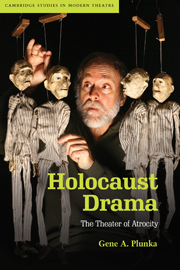Book contents
- Frontmatter
- Contents
- Acknowledgments
- 1 Introduction
- 2 Staging the Banality of Evil
- 3 Culture and the Holocaust
- 4 The Holocaust as Literature of the Body
- 5 Transcending the Holocaust
- 6 Marxism and the Holocaust
- 7 Aryan Responsibility During the Holocaust, I
- 8 Aryan Responsibility During the Holocaust, II
- 9 Heroism and Moral Responsibility in the Ghettoes
- 10 Dignity in the Concentration Camps
- 11 Holocaust Survivors in the United States and Israel
- 12 The Survivor Syndrome and the Effects of the Holocaust on Survivor Families
- 13 Holocaust Survivor Memory
- 14 The Holocaust and Collective Memory
- Notes
- Bibliography
- Index
5 - Transcending the Holocaust
Published online by Cambridge University Press: 01 July 2009
- Frontmatter
- Contents
- Acknowledgments
- 1 Introduction
- 2 Staging the Banality of Evil
- 3 Culture and the Holocaust
- 4 The Holocaust as Literature of the Body
- 5 Transcending the Holocaust
- 6 Marxism and the Holocaust
- 7 Aryan Responsibility During the Holocaust, I
- 8 Aryan Responsibility During the Holocaust, II
- 9 Heroism and Moral Responsibility in the Ghettoes
- 10 Dignity in the Concentration Camps
- 11 Holocaust Survivors in the United States and Israel
- 12 The Survivor Syndrome and the Effects of the Holocaust on Survivor Families
- 13 Holocaust Survivor Memory
- 14 The Holocaust and Collective Memory
- Notes
- Bibliography
- Index
Summary
Most Holocaust playwrights have readily tied the Shoah to political, social, or economic conditions prevailing in Germany during the 1920s and 1930s. Two Holocaust dramas, Eli and The Diary of Anne Frank, transcend the Holocaust by universalizing the experience, leaving the audience with the philosophical notion that the Shoah was essentially a quasi-moral or religious battleground, a momentary phase of history in which evil temporarily triumphed over good.
German poet and playwright Nelly Sachs emigrated to Stockholm, Sweden, in May 1940 after receiving Nazi orders to report to a forced labor camp. She wrote the verse drama Eli, Ein Mysterienspiel vom Leiden Israels (Eli: A Mystery Play of the Sufferings of Israel) in 1943 before the culmination of the Final Solution, making it the first Holocaust drama ever written. Eli was initially broadcast in Germany as a radio play in 1958 and then premiered on stage in Dortmund in 1961. Courted by the Gesellschaften für Christlich–Jüdische Zusammenarbeit (Societies for Christian-Jewish Cooperation), an organization that tried to maintain a Christian-Jewish dialogue in postwar West Germany, Sachs soon saw her play highly praised by German theater reviewers for its spirit of conciliation. Eli has since been staged in Sweden, Great Britain, and the United States, where it premiered in 1981 at the Guthrie Theater in Minneapolis. On 10 December 1966, Sachs and Hebrew writer Samuel Joseph Agnon shared the Nobel Prize in Literature, thus giving Sachs, previously virtually unknown outside of Germany, international recognition as a Holocaust writer who mediated postwar tensions.
- Type
- Chapter
- Information
- Holocaust DramaThe Theater of Atrocity, pp. 94 - 113Publisher: Cambridge University PressPrint publication year: 2009

